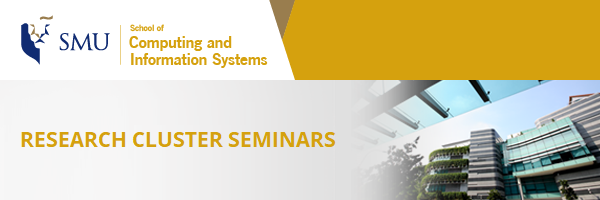| |

| Date: | 8 November 2024, Friday | Time: | 3:45pm to 4:45pm | Venue: | School of Computing & Information Systems 1 (SCIS1), Level 2, Seminar Room 2-4, Singapore Management University, 80 Stamford Road, Singapore 178902 |
|

Limited seating. Registration will close on 27 October or once maximum capacity is reached. Registration is required for attendance. Light refreshment will be provided after the talks. Research Cluster: Artificial Intelligence & Data Science | | | Topic: | User Simulation with Role-playing Language Agents | Speaker: | DENG Yang, Assistant Professor of Computer Science | Abstract: | As Large Language Models (LLMs) increasingly permeate various sectors—ranging from healthcare and education to business and customer service—the nature of interactions among humans and AI agents is evolving at an unprecedented pace. LLM-powered language agents not only redefine user interaction but also demonstrate remarkable role-playing capabilities. In the field of dialogue and interactive systems, user simulation is a long-standing problem, which is crucial for evaluating and improving the systems. In this talk, I will introduce my recent works on taking the advantages of the role-playing capabilities of LLMs to simulate diverse users for dialogue studies, and discuss some findings and challenges on simulating users with role-playing language agents. |
| | | Topic: | Towards a Comprehensive Theory of Implicit Rank Restriction in Deep Matrix Completion and Beyond | Speaker: | Antoine LEDENT, Assistant Professor of Computer Science | Abstract: | Matrix completion, the problem of recovering an unknown matrix from a small subset of observed entries, has a rich set of applications, including recommender systems and drug interaction prediction. Learning is typically performed by regularizing some convex or non-convex relaxations of the rank, such as the nuclear norm or other functions of the recovered matrix’s singular spectrum. While there is a substantial literature on the sample complexity of the problem, many open questions remain, as the technical challenges can vary significantly depending on the sampling distribution, the noise level, and the specific algorithm used. In this talk, I will briefly summarize some of the state-of-the-art results for matrix completion under arbitrary sampling and present some of my recent findings on the sample complexity of deep matrix factorization and related models. In addition to providing theoretical justification for the success of some neural network matrix completion methods, these results offer a learning theory perspective on an important, recently discovered phenomenon in the deep learning literature: increasing depth encourages neural networks to learn lower-dimensional bottleneck representations compared to shallower networks. Finally, I will discuss extensions to the nonlinear case and ongoing work towards further studying this phenomenon in various deep neural network architectures. |
| | | Topic: | Data-Driven Methods and Applications in Smart Cities | Speaker: | WANG Hai, Associate Professor of Information Systems | Abstract: | The rapid development and widespread adoption of mobile devices, sensors, IoT, and communication technology have led to the generation of vast volumes of multi-source, high-dimensional data in various systems within the broader framework of smart cities, including transportation, logistics, e-commerce, healthcare, etc. Numerous data-driven methods have been developed and implemented to address challenges related to the design and operations of these systems. In this talk, we briefly discuss three research cases on the applications of data-driven methods in smart cities, include: (1) descriptive methods for mobile transaction digits distribution; (2) predictive methods for ICU patient evaluation; (3) and prescriptive method for multi-objective matching in ride-sourcing transportation. |
| | | ABOUT THE SPEAKER(S) | | |  | DENG Yang is an Assistant Professor in the School of Computing and Information Systems at Singapore Management University. Prior to that, he was a Research Fellow at National University of Singapore, and obtained his Ph.D. degree from the Chinese University of Hong Kong. His research interests lie in natural language processing and information retrieval, with a special focus on conversational and interactive systems. He actively publishes papers at top-tier venues (including ICLR, ACL, EMNLP, SIGIR, WWW, etc) and serves as the Area Chairs of ACL/EMNLP/NAACL/COLING. He has organized multiple tutorials with the topic of advanced technologies at leading conferences, including ACL 2023, WWW 2024, and SIGIR 2024. | | |  | Antoine LEDENT is an Assistant Professor in the School of Computing and Information Systems at SMU. His research focuses on statistical learning theory and recommender systems, with a special emphasis on matrix completion and other low-rank methods. Prior to joining SMU, he was a postdoctoral researcher at TU Kaiserslautern. He obtained his PhD in mathematics from the University of Luxembourg and his bachelor’s and master’s degrees in mathematics from the University of Cambridge.
| | |  | Dr. WANG Hai is an Associate Professor in the School of Computing and Information Systems at Singapore Management University and a visiting faculty at the Heinz College of Information Systems and Public Policy at Carnegie Mellon University. He serves as Chief Data Officer for the M3S AI program on Singapore-MIT Alliance for Research and Technology, AI and OR Advisor for Changi Airport Group, and Secretary for INFORMS Transportation Science and Logistics Society. Dr. Wang received B.S. from Tsinghua University and Ph.D. in Operations Research from MIT. His research focuses on analytics and optimization, data-driven decision-making, machine learning, and their applications in smart cities, transportation and logistics systems. He serves as Associate Editor for Transportation Science and Service Science, and Editorial Board for Transportation Research Part B/C/E. Dr. Wang was listed in the World’s Top 2% Scientists by Stanford/Elsevier for consecutive years, selected as Chan Wu & Yunying Rising Star Fellow in transportation and mobility, received Lee Kong Chian Research Excellence Award twice, and was nominated for Excellent Teaching Award at both MIT and SMU. During his Ph.D. at MIT, he also served as the co-President of the MIT Chinese Students & Scholars Association and as Chair of the MIT-China Innovation and Entrepreneurship Forum. | | | SEMINAR MODERATOR | | |  | LIM Ee-Peng
Professor of Computer Science Director, Artificial Intelligence & Data Science Cluster
|
|
|
|
|